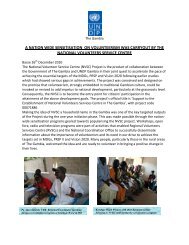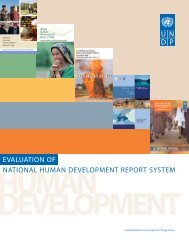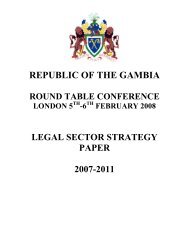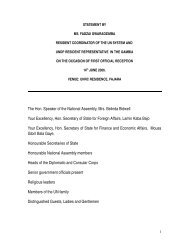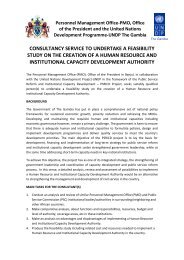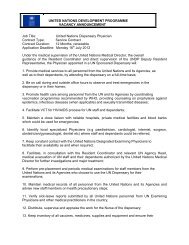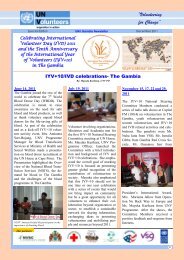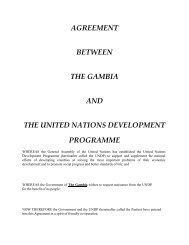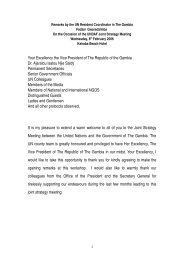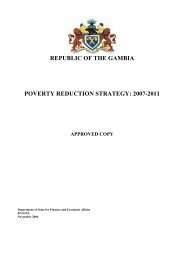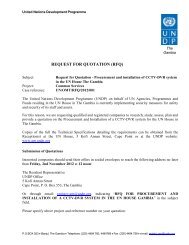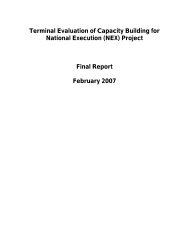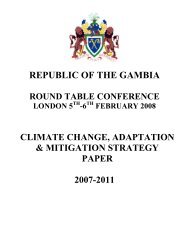Introduction - UNDP The Gambia
Introduction - UNDP The Gambia
Introduction - UNDP The Gambia
Create successful ePaper yourself
Turn your PDF publications into a flip-book with our unique Google optimized e-Paper software.
________________________________________________________________________________________________________________________<br />
2.5.1 <strong>UNDP</strong> - Economic<br />
Management and Capacity Building<br />
Project<br />
This programme was launched on 20 May<br />
2003 and has three major goals:<br />
• to facilitate improvements in long-term<br />
planning so as to make public<br />
investment more efficient and useful.<br />
• to supplement the efforts of<br />
development partners in the<br />
enhancement of economic management<br />
capacity building<br />
• to develop business culture and<br />
practices in private sector institutions<br />
and companies.<br />
In addition to providing training for personnel<br />
involved in economic management in key<br />
sectors, the project recruited eleven<br />
consultants to conduct sectoral studies for the<br />
preparation of the Medium-Term Plan<br />
document, to prepare guidelines for the threeyear<br />
rolling Public Investment Programme<br />
and to review progress in the implementation<br />
of the PRSP. To enhance institutional<br />
capacity building, the project funded a study<br />
on the establishment of a National Planning<br />
Commission.<br />
<strong>The</strong> National Planning Commission will act<br />
as an integrating force to ensure that national<br />
development plans are consistent with<br />
national aspirations and in conformity with<br />
the national vision. It will have the authority<br />
to coordinate the national development<br />
agenda, prioritise development programmes,<br />
monitor programme implementation and<br />
assess post-implementation impact.<br />
While achievements have been impressive,<br />
the project equally faced major challenges<br />
and constraints, including the following:<br />
• late sensitisation of policy makers,<br />
namely: the High Level Economic<br />
Committee and technical staff to facilitate<br />
broad ownership of the programme<br />
• National counterpart arrangements were<br />
very unsatisfactory<br />
• Administrative bottlenecks and protracted<br />
bureaucracy within Government and the<br />
<strong>UNDP</strong> delayed project activities<br />
• lack of comprehensive training plans by<br />
beneficiaries to facilitate prioritisation of<br />
training requests.<br />
2.5.2 World Bank - Capacity Building<br />
for Economic Management Project<br />
This project, which commenced in January<br />
2002, is essentially designed to develop<br />
capacity in key government agencies for<br />
economic policy formulation and<br />
execution. It specifically focuses on<br />
improving the capacities of the revenuegenerating<br />
departments and the Central<br />
Statistics Department. Unfortunately, the<br />
implementation of the different components<br />
of the project has been extremely slow and<br />
many of the performance indicators have not<br />
been met. As a result, at the mid-term review<br />
in 2005, the World Bank rated the project<br />
“Unsatisfactory”.<br />
Progress on the CSD’s strategy, revision of<br />
the Statistics Act, the household survey and<br />
the economic census are all substantially<br />
behind schedule. Little progress has been<br />
made on securing technical assistance for<br />
developing macro-economic models to<br />
improve revenue forecasting. A detailed plan<br />
for integrating the two revenue-generating<br />
departments - Income Tax and Customs and<br />
Excise, including new organisation,<br />
procedures and human resource policy – has<br />
yet to be prepared.<br />
<strong>The</strong> National Planning Commission will act<br />
as an integrating force to ensure that national<br />
development plans are consistent with<br />
national aspirations and in conformity with<br />
the national vision. It will have the authority<br />
to coordinate the national development<br />
agenda, prioritise development programmes,<br />
monitor programme implementation and<br />
assess post-implementation impact.<br />
<strong>The</strong> Automated System of Customs Data<br />
(ASYCUD) in the Department of Customs<br />
and Excise is not yet fully operational, partly<br />
as a result of lack of information technology<br />
support, staff attrition and inadequate trained<br />
human resources. <strong>The</strong> project seeks to build<br />
the capacity of the judicial and financial<br />
systems to facilitate private sector<br />
________________________________________________________________________________________________<br />
Building Capacity for the Attainment of the Millennium Development Goals in <strong>The</strong> <strong>Gambia</strong> National Human Development Report 2005<br />
19



